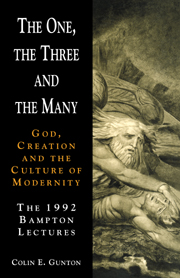Book contents
- Frontmatter
- Contents
- Preface
- Introduction
- PART ONE THE DISPLACEMENT OF GOD
- PART TWO RETHINKING CREATEDNESS
- 5 The universal and the particular. Towards a theology of meaning and truth
- 6 ‘Through whom and in whom …’ Towards a theology of relatedness
- 7 The Lord who is the Spirit. Towards a theology of the particular
- 8 The triune Lord. Towards a theology of the one and the many
- Bibliography
- Index
7 - The Lord who is the Spirit. Towards a theology of the particular
Published online by Cambridge University Press: 05 June 2012
- Frontmatter
- Contents
- Preface
- Introduction
- PART ONE THE DISPLACEMENT OF GOD
- PART TWO RETHINKING CREATEDNESS
- 5 The universal and the particular. Towards a theology of meaning and truth
- 6 ‘Through whom and in whom …’ Towards a theology of relatedness
- 7 The Lord who is the Spirit. Towards a theology of the particular
- 8 The triune Lord. Towards a theology of the one and the many
- Bibliography
- Index
Summary
THE CONCEPT OF SPIRIT
In the second chapter I argued that one spectre at the banquet of the modern world was homogeneity, symbolized by the idea of a Coca Cola advertisement in every village in the world. The pressures for homogeneity are various: philosophical, political, social but above all perhaps commercial. Homogenizing pressures take away our individuality and particularity, and make us all alike. Despite all the aims of modern enlightenment, there is a pressure for homogeneity in which the distinctiveness of particulars is called into question or suppressed. In this chapter, I want to explore the notion of particularity – that which makes us distinctive and non-homogeneous – and would begin with a simple point. It is often said that one of the intellectual drawbacks of Christianity is its elements of particularity. The fact that so much of the faith's content is linked to a particular human figure, and behind him a particular national history, and indeed that neither of them has any manifest worldhistorical importance, generates what is called the scandal of particularity. It has often appeared to the rational mind that there is something inherently problematic about a faith that is, unlike so many of the philosophies and religions of the world, not a general teaching but the proclamation of historical particularities as the centre of an account of God's being and activity.
- Type
- Chapter
- Information
- The One, the Three and the Many , pp. 180 - 209Publisher: Cambridge University PressPrint publication year: 1993

